The 2013 Good Gift Games
During holiday family get-togethers, don't risk bringing up a topic everyone's hoping to avoid. Instead, bring a board game and circumvent all conversation. Here are 10 of the best from 2013.

Ah, the holidays. That time of year when people of wildly divergent tastes, opinions, and political views come together under one roof to form that most heterogeneous of units: the extended family. Navigating this conversational landscape can be like playing Operation: You gingerly insert a new topic into the room and attempt to extract the viewpoints of others, without setting off the Buzzer of Familial Discord. “So hey Uncle Jeb, how about that Obamacare?” BRRRRT!
But board games can serve as more than just a metaphor for the season, they can also function as a palliative of sorts, allowing you and your kind to focus on something other than how unhinged you all appear to one another. Why quarrel over the merits of capitalism when you can simply break out the Monopoly and drive one another to penury?
Or, if you’ve had your fill of the classics, there’s no shortage of contemporary board games from which to choose, perfectly suited for presents or diversions to play leading up to the holiday. Every year I compile a list of the year’s best “Good Gift Games,” highlighting those that are easy to learn and teach, fun and engrossing to play, and that can be completed in 90 minutes or less.
Board games are often lauded for their ability to bring families together, but these 10 will prevent yours from flying apart.
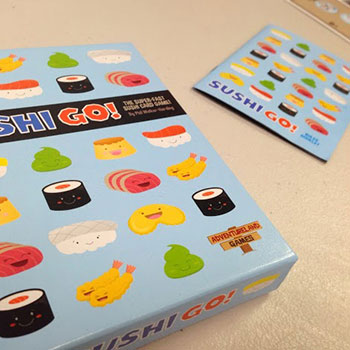
Sushi Go!
This year on Thanksgiving my family enjoyed turkey and stuffing and mashed potatoes followed by nigiri and sashimi and tempura, as we spent the hour following dinner playing Sushi Go! Players begin with a hand of nine cards and simultaneously select one to play to the table; afterward everyone passes their eight-card hands to the left, chooses another card to play from their new hand, and so on, until all cards have been claimed. What makes the game interesting is that every type of food scores a different way: Only the players with the most or second-most sushi score points, tempura only scores in pairs, each dumpling scores more points that the last, etc. It’s the simplest game on this list, but Go Sushi! has sufficient flavor to keep you coming back for seconds.
Designer: Phil Walker-Harding
Publisher: Adventureland Games
Players: 2–5
Time: 20 minutes
Genre: Card drafting
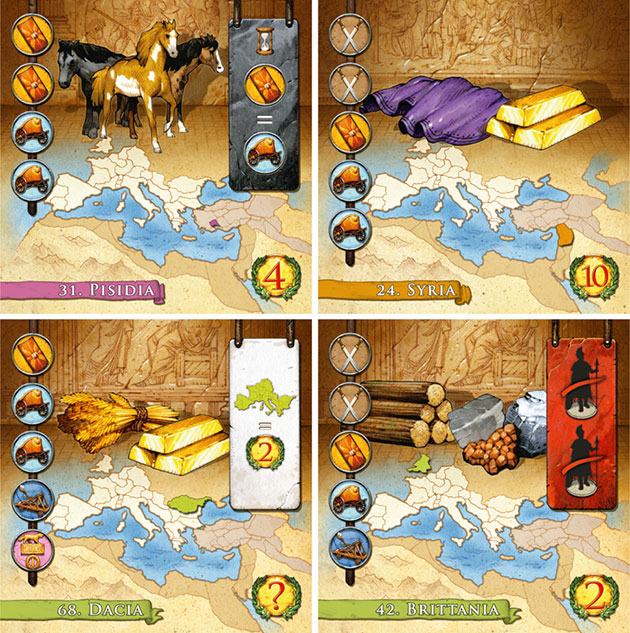
Rise of Augustus
At some point during the reading of the Rise of Augustus rules you will realize that the game is a glorified version of Bingo. True enough, but the glorification is pretty glorious. Each turn a token is randomly drawn from a bag, and players look to see if they have a matching symbol on one or more of their objective cards. Fill an objective card and it’s complete; the game ends when someone completes their seventh. The game diverges from the bingo formula, however, in that a drawn token can only fulfill one symbol space, regardless of how many of that kind you have on your three objective cards, forcing you to choose its allocation. And the choice is important, as objectives award bonuses and special powers when completed, which make the completion of future objectives easier. Add to this the Roman theme and attractive artwork, and you have a game that handily transcends its humble bingo beginnings.
Designer: Paolo Mori
Publisher: Hurrican
Players: 2–6
Time: 30 minutes
Genre: Bingo? I guess?
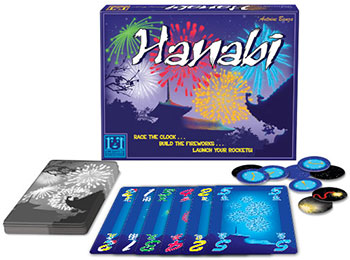
Hanabi
Cooperative games used to be a rarity, with a new one released every year or so. But in the last decade they have become ubiquitous, and now a new entry in the genre needs to incorporate a gimmick or have an exceptionally elegant design if it wishes to stand out from the pack. Hanabi has both. Each player starts with a hand of five cards, which they hold backwards, exposing the suits and values to the other players while keeping them hidden from the owner. On a turn a player may either provide someone else with a hint about the cards they hold, or play one from their own hand. As cards must be played in a specific order, a player must rely on the scant information they receive from others, as well as their deductive reasoning and a dash of luck, to pick the correct card to play—assuming they have it at all. Hanabi is not only unique in the field of cooperative games, its central mechanism is unlike anything I have seen before.
Designer: Antoine Bauza
Publisher: R&R Games
Players: 2–5
Time: 30 minutes
Genre: Cooperative, deductive
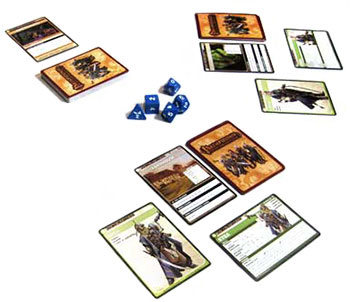
Pathfinder Adventure Card Game
Pathfinder Adventure Card Game meets approximately 0 of the Good Gift Game Guide criteria—it is complicated, it takes 90 to 120 minutes to play, and it costs 70 bucks when you factor in the borderline-obligatory expansion. Even so, I would be remiss to omit it. Not only is it the game I have played the most this year, but it is the highest rated game of 2013 in the BoardgameGeek database. More to the point, it would be an amazing gift for the right person. Based on the wildly popular Pathfinder tabletop RPG, the adventure card game casts players as wizards and warriors and rogues, searching locations for a villain and his henchmen. What sets Pathfinder apart from the myriad of other D&D-lite board and card games is that you build your character’s personalized deck over the course of several games. If you find a sword while playing a scenario, for instance, you can start the next game with it in your possession. The game provides a narrative arc designed to offer years of rich, ever-changing play.
Designer: Mike Selinker
Publisher: Paizo Publishing
Players: 1–4 (1–6 with expansion)
Time: 90 minutes
Genre: Card, cooperative, fantasy
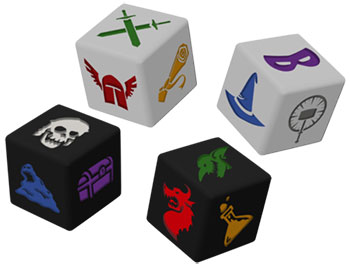
Dungeon Roll
Or, if the 24-page rulebook and months-long campaign time of the Pathfinder Adventure Card Game strikes you as excessive, you can head to the opposite end of the Dungeon Crawl spectrum and pick up Dungeon Roll, a super light dicefest from Tasty Minstrel Games. First form a party of adventurers by rolling a handful of specialized dice, giving you fighters, wizards, clerics, and thieves; then descend into a dungeon and battle goblins, oozes, and possibly even a dragon. Dice cancel each other out (a cleric, for instance, will negate one or more skeletons), allowing you to delve ever deeper. But if your party is wiped out before you opt to flee, you lose all of the experience points you have accumulated thus far. Dungeon Roll is a near-perfect bar game and even works well as solitaire, allowing you to take down a tribe of skeletons in the 10 minutes before you hit the hay.
Designer: Chris Darden
Publisher: Tasty Minstrel Games
Players: 1–4
Time: 15 minutes
Genre: Dice, push-your-luck, fantasy
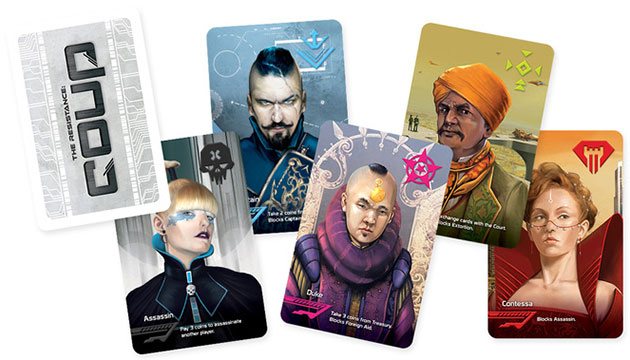
Coup
One of the most popular light card games in recent years is The Resistance, a streamlined version of Werewolf from Indie Boards and Cards. This year IBC brings us The Resistance: Coup, and although the two games are not directly related, they both require bluffing, deceit, and what they have dubbed “social deduction” (i.e., figuring out whether your friend is lying to your face). Each player secretly controls two members of the ruling class, with each character having its own unique power. On a turn, however, a player may claim to own any character, use the corresponding ability, and, if bluffing, pray they don’t get called on it. Like its predecessor, Coup is the sort of game that can be played in 15 minutes, but will ruin friendships that were forged over a lifetime.
Designer: Rikki Tahta
Publisher: Indie Boards and Cards
Players: 2–6
Time: 10 minutes
Genre: Hidden identity, deductive
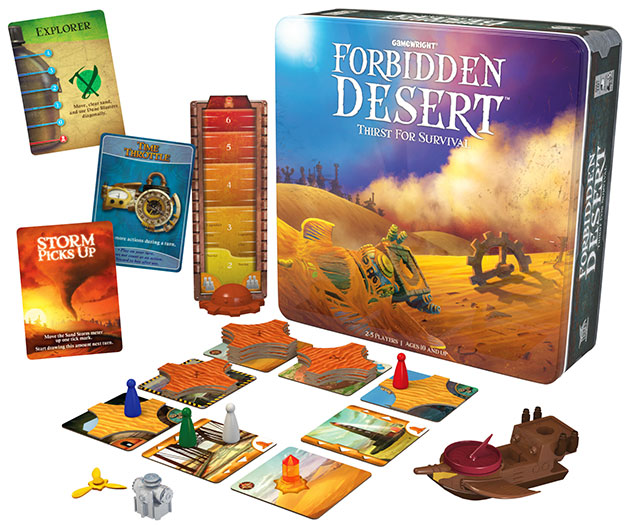
Forbidden Desert
My top pick for the 2008 Good Gift Guide was Pandemic, a cooperative game by Matt Leacock with several novel mechanics. Leacock went on to design Forbidden Island, which re-implemented some of those ideas in a game suitable for a younger audience. Now comes Forbidden Desert, the third installment of Leacock’s trilogy, which shares much of Forbidden Island’s look and feel, but slightly dials up the complexity and challenge. Players work as a team, searching an arid wasteland for the missing pieces of a lost flying ship. Complicating their efforts are the harsh desert winds that blow the dunes across the board, burying some locations (and the sought-after pieces) under mountains of sand. I haven’t decided which I prefer, Forbidden Island or Forbidden Desert; fortunately they are sufficiently different that I need not, as each provides a distinct gaming experience.
Designer: Matt Leacock
Publisher: Gamewright
Players: 2–5
Time: 45 minutes
Genre: Cooperative
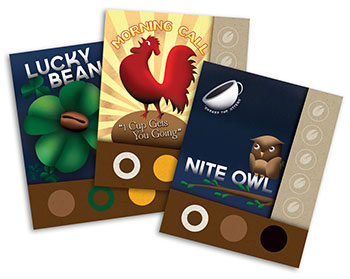
VivaJava: The Coffee Game
Games for groups of six or more are rare, doubly so if you want something with bit of strategy. Thankfully, VivaJava occupies that niche well and has become my go-to game when the ranks of a gamenight swell beyond five. In each round players divide up into ad-hoc teams, and compete to craft the perfect blend of coffee. This is done by drawing small wooden coffee beans from a bag, and then comparing the resultant “blend” with those of the other teams using a poker-style ranking system. (A blend with two red beans and three green, for instance, would beat a blend containing two pairs and a single.) And because teams collaborate on their concoctions simultaneously, the game clocks in at about 90 minutes regardless of how many baristas you have in the kitchen.
Designer: TC Petty III
Publisher: Dice Hate Me Games
Players: 3–8
Time: 90 minutes
Genre: Large group, poker-esque
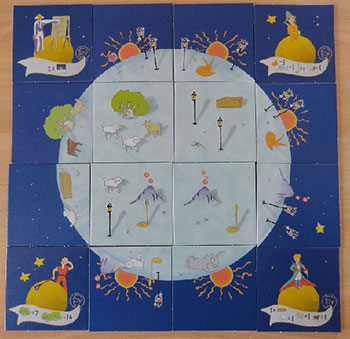
The Little Prince: Make Me a Planet
Tile-laying games are among the most accessible and engaging available, and The Little Prince: Make Me a Planet is no exception—simple enough for children but with plenty for adults to enjoy. Each player assembles 16 tiles into a four-by-four planet covered in various features: volcanoes, sunsets, lampposts, and more. They also choose four characters that determine how their planet will be scored, with the Hunter awarding points for animals, the Gardener favoring tiles with Baobab trees, and so forth. Because the tiles available for selection are limited, players can conspire amongst themselves to force someone to take one that will undo their plans, injecting an element of diplomacy (and treachery) into what is otherwise a delightful game of construction.
Designers: Antoine Bauza & Bruno Cathala
Publisher: Ludonaute
Players: 2–5
Time: 30 minutes
Genre: Tile laying, children’s
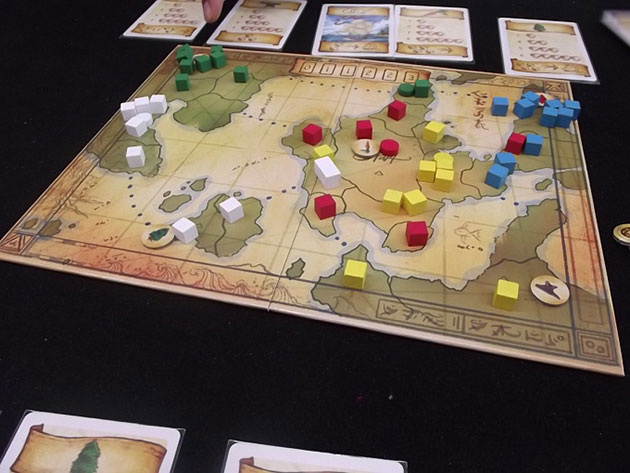
Eight-Minute Empire
I love civilization games, but some can run three hours or longer. You need not set aside a weekend afternoon for Eight-Minute Empire though, which takes only slightly longer to play than is promised in the title. The gameplay of longer “civ” games are here condensed into a single deck of cards, which allow players to raise armies, march them across the board, amass goods, build cities, and the like. All a player must do on their turn is decide which card to buy and execute, but the interaction between the various possibilities—not to mention the position and intention of their opponents—make this decision easier said than done. Why build a world from scratch when, in the same amount of time, you can conquer one 10 times over?
Designer: Ryan Laukat
Publisher: Red Raven Games
Players: 2–4
Time: 15 minutes (yeah, I know: false advertising)
Genre: Area control, set collection
Note: Eight Minute Empire juuuuust went out of stock—it was available on Amazon yesterday, I swear. I have not yet played Eight-Minute Empire: Legends, but the sequel is rumored to be an improvement, and is due for release on Dec. 9.
For Matthew Baldwin’s favorite advanced strategy games of the year, visit defective yeti.
